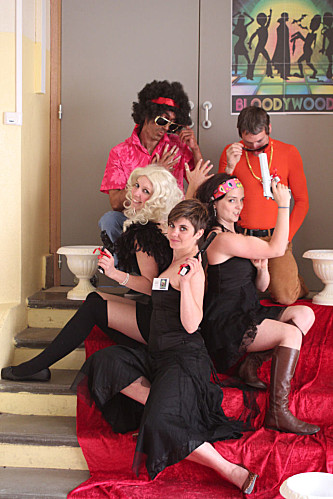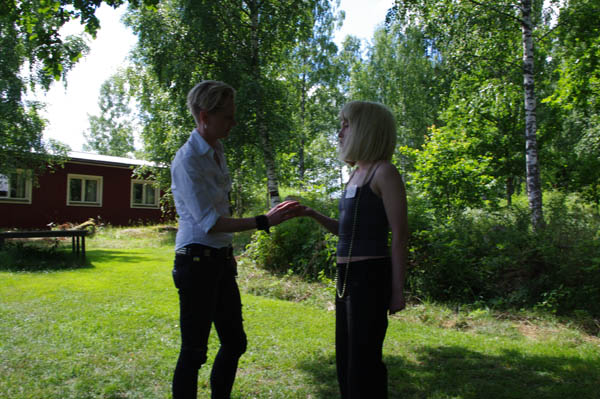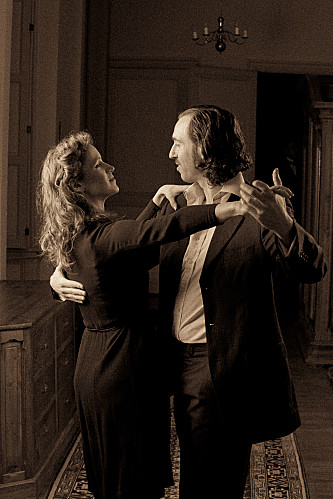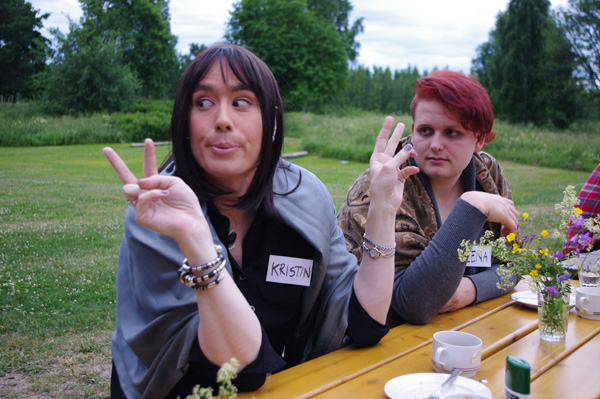Original post : http://www.electro-gn.com/477-critique-studiobloodywood
Translation : David Brosselin and Bruno Cailloux
Le 5ème Éléphant (the Fifth Elephant) likes to vary the pleasures. Renowned for its games in the oppressive atmosphere as Rijker prison, or Angst, a historical game taking place during the Thirty Years War, the Chambéry association is not averse lighter topics, according his multiple games in the world of comics Lanfeust of Troy, or even their last production entitled : Studio Bloodywood.
The pitch is clear : In the middle of the seventies, disco fever in full swing, players will embody professionals working in film studios Bloodywood, specializing in Z series horror films. The authors communication around the game clearly define their intentions : no NPCs, no mission or objectives for the characters, it will be a trivia game where the characters are at work. Everyone will have a defined job that he must fulfill within a film crew (there will be four teams), and each crew will make a movie. The authors state : “We entrust 100% of the story to the players.”
A few months before the event, we can begin to imagine how the game will stage, and that effective communication allows players to know what to expect and knowingly register.
As first documents are sent, players are confirmed in this feeling. The emphasis is on fun and relaxed atmosphere, the authors obviously had fun to parody number of box office successes, characters are caricatures of famous movie stars too. Backgrounds are succinct but are not the whole, focusing on the anecdotes of previous shootings and opinion groups to wich the characters belong, to install their psychology and personality, and create some relations between them. Regarding the rules, the skills of the film industry are rather well thought out, and a system of popularity for each character to be paid according to his rating is announced, without the authors give more detail.
We guess the challenge for the authors will be logistical. How to represent movie studios and ensure that people will shoot a film ? The ingame site visit on Friday night bodes well for the future : six studios are represented, each differently decorated, with projectors to ensure enough light, and an impressive stock of accessories is available for players embodying props people. Moreover, the authors asked each player to bring extra costumes and accessories, so equipment did not lack. A small snag about sound, directly miked from camcorders, that could sometimes make dialog difficult to hear.
Regarding the pace of the game, the authors have shown particularly intelligent, cutting efficiently the game in different phases. Thus the characters find themselves on Friday night to discover the studios, then each of the four producers is given the constraints for his film : its budget, target audience, some scriptwriting obligations, or having to place a promotional item. Then the evening allows teams to form, to establish a concept of film and start shooting some tests, to familiarize themselves with the equipment and see what really happens during a filming session. However the work really begins on Saturday. The day is divided into six shooting-stages, an hour each, intercut with one hour of preparation. This “mandatory break” allows each team to prepare everything they need for the next hour : book a studio, recruiting actors, find THE good prop, etc. Each team is forced to establish its own schedule in accordance with the others, to avoid realizing at the last moment that the intended studio is not available, or its headlining actor planned to work on another film in the same time. This division into sharp shooting-sessions probably prevented the game to be a total chaos, and inspired a particularly dense rhythm, contributing to this atmosphere of successful workday.
However, some rules imposed on producers were very heavy during the game. Having to note the updated popularity of each character to re-calculate his salary for each hour of shooting has finally shown clumsy. The popularity might have some interesting aspects, such as pushing actors becoming too famous to the whims of a star, but the influence on wages had little interest, as money was used mainly to purchase food and drink. All this part of the rules was finally very complex to manage for a limited gain.
But other constraints set by the authors were more inspired. To spice things up a bit, they had visibly fun to gradually add disrupting events to shooting sessions, as the unexpected switch of studios or accessories between two crews, pushing them to be ingenious to get by.
What is striking in this LARP, is the work done at the end of the game and the very special balance between players and characters. So during the game, characters are the ones who are making a film, and if we can feel they are quite muted because they are very busy doing their job, they are still present in players’s minds. Characters are the ones who put so much willingness in their project, even though the players are aware of their amateurish and limited means, and characters are the ones who decide to direct their film in a particular direction, according to their beliefs or their fad of the moment.
Yet, at the end of the game, when each team watches the rushes, players are the ones who are conscious of having made a film, naturally feel pride of well done work, despite their production’s poor quality. If we had told each participant that with only one day of shooting, with a team of totally inexperienced people, they managed to make a movie, nobody would have thought it possible. But the exploit is real, and pleasantly suggests other things that LARP could accomplish.
This feeling rises from players’ creativity but also emerges from the freedom of action left to them, as the authors promised before the game. We can also easily imagine that this LARP may be proposed again, with the same players or other, different teams will constitute, and shoot movies without common point with the previous.
You get out of most games with some souvenirs of the event, some photos or footage to revive memories. Bloodywood Studio adds another dimension by allowing each player to bring back a concrete application of what he achieved during the LARP. The simple enjoyment of the game mixes with the sense of the creation.
Bloodywood Studio – Le 5ème Eléphant
Lio nel Cou rtois
Eli se Desch aux



